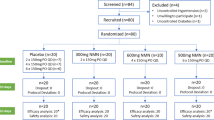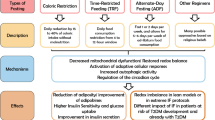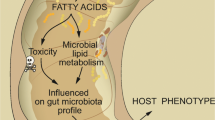Abstract
Purpose
Post-prandial phase is characterized by enhanced oxidative stress but the underlying mechanism is unclear. We investigated if gut-derived lipopolysaccharide (LPS) is implicated in this phenomenon and the effect of extra virgin olive oil (EVOO) in patients with impaired fasting glucose (IFG).
Methods
This is a randomized cross-over interventional study including 30 IFG patients, to receive a lunch with or without 10 g of EVOO. Serum LPS, Apo-B48, markers of oxidative stress such as oxidized LDL (oxLDL) and soluble Nox2-derived peptide (sNox2-dp), a marker of nicotinamide-adenine-dinucleotide-phosphate oxidase isoform Nox2 activation, and plasma polyphenols were determined before, 60 and 120 min after lunch.
Results
In patients not given EVOO oxidative stress as assessed by sNox2-dp and oxLDL significantly increased at 60 and 120 min concomitantly with an increase of LPS and Apo-B48. In these patients, changes of LPS were correlated with Apo-B48 (Rs = 0.542, p = 0.002) and oxLDL (Rs = 0.463, p = 0.010). At 120 min, LPS (β − 15.73, p < 0.001), Apo-B48 (β − 0.14, p = 0.004), sNox2-dp (β − 5.47, p = 0.030), and oxLDL (β − 42.80, p < 0.001) significantly differed between the two treatment groups. An inverse correlation was detected between polyphenols and oxLDL (R − 0.474, p < 0.005). In vitro study showed that LPS, at the same concentrations found in the human circulation, up-regulated Nox2-derived oxidative stress via interaction with Toll-like receptor 4.
Conclusions
Post-prandial phase is characterized by an oxidative stress-related inflammation potentially triggered by LPS, a phenomenon mitigated by EVOO administration.


Similar content being viewed by others
References
Valdivielso P, Puerta S, Rioja J et al (2010) Postprandial apolipoprotein B48 is associated with asymptomatic peripheral arterial disease: a study in patients with type 2 diabetes and controls. Clin Chim Acta 411(5–6):433–437
O’Keefe JH, Bell DSH (2007) Postprandial hyperglycemia/hyperlipidemia (postprandial dysmetabolism) is a cardiovascular risk factor. Am J Cardiol 100(5):899–904
Meigs JB, Nathan DM, D’Agostino RB Sr et al (2002) Fasting and postchallenge glycemia and cardiovascular disease risk: the Framingham offspring study. Diabetes Care 25(10):1845–1850
ECODE Study Group (2001) The European Diabetes Epidemiology Group Glucose tolerance and cardiovascular mortality: comparison of fasting and 2-hour diagnostic criteria. Arch Intern Med 161(3):397–405
Carnevale R, Bartimoccia S, Nocella C, Di Santo S et al (2014) LDL oxidation by platelets propagates platelet activation via an oxidative stress-mediated mechanism. Atherosclerosis 237(1):108–116
Harte AL, Varma MC, Tripathi G et al (2012) High fat intake leads to acute postprandial exposure to circulating endotoxin in type 2 diabetic subjects. Diabetes Care 35(2):375–382
Nocella C, Carnevale R, Bartimoccia S et al (2017) Lipopolysaccharide as trigger of platelet aggregation via eicosanoid over-production. Thromb Haemost 117(8):1558–1570
Carnevale R, Pignatelli P, Nocella C et al (2014) Extra virgin olive oil blunt post-prandial oxidative stress via NOX2 down-regulation. Atherosclerosis 235(2):649–658
Nóvoa FJ, Boronat M, Saavedra P et al (2005) Differences in cardiovascular risk factors, insulin resistance, and insulin secretion in individuals with normal glucose tolerance and in subjects with impaired glucose regulation: the Telde study. Diabetes Care 28(10):2388–2393
Carnevale R, Pastori D, Nocella C et al (2017) Low-grade endotoxemia, gut permeability and platelet activation in patients with impaired fasting glucose. Nutr Metab Cardiovasc Dis 27(10):890–895
American Diabetes Association (2005) Diagnosis and classification of diabetes mellitus. Diabetes Care 28:S37–S42
Serafini M, Maiani G, Ferro-Luzzi A (1998) Alcohol-free red wine enhances plasma antioxidant capacity in humans. J Nutr 128(6):1003–1007
Pignatelli P, Carnevale R, Cangemi R et al (2010) Atorvastatin inhibits gp91phox circulating levels in patients with hypercholesterolemia. Arterioscler Thromb Vasc Biol 30:360–367
Carnevale R, Pignatelli P, Lenti L et al (2007) LDL are oxidatively modified by platelets via GP91(phox) and accumulate in human monocytes. FASEB J 21(3):927–934
Wiedermann CJ, Kiechl S, Dunzendorfer S et al (1999) Association of endotoxemia with carotid atherosclerosis and cardiovascular disease: prospective results from the Bruneck Study. J Am Coll Cardiol 34(7):1975–1981
Ghoshal S, Witta J, Zhong J et al (2009) Chylomicrons promote intestinal absorption of lipopolysaccharides. J Lipid Res 50(1):90–97
Clemente-Postigo M, Queipo-Ortuño MI, Murri M et al (2012) Endotoxin increase after fat overload is related to postprandial hypertriglyceridemia in morbidly obese patients. J Lipid Res 53(5):973–978
Van Greevenbroek MM, De Bruin TW (1998) Chylomicron synthesis by intestinal cells in vitro and in vivo. Atherosclerosis 141:S9–S16
Violi F, Loffredo L, Pignatelli P et al (2015) Extra virgin olive oil use is associated with improved post-prandial blood glucose and LDL cholesterol in healthy subjects. Nutr Diabetes 5:e172
Perez-Herrera A, Delgado-Lista J, Torres-Sanchez LA et al (2012) The postprandial inflammatory response after ingestion of heated oils in obese persons is reduced by the presence of phenol compounds. Mol Nutr Food Res 56(3):510–514
Xiao C, Dash S, Morgantini C et al (2014) Sitagliptin, a DPP-4 inhibitor, acutely inhibits intestinal lipoprotein particle secretion in healthy humans. Diabetes 63(7):2394–2401
Servili M, Sordini B, Esposto S et al (2013) Biological activities of phenolic compounds of extra virgin olive oil. Antioxidants 3(1):1–23
Acknowledgements
We thank prof. Lorenzo Loffredo for his useful advice.
Funding
This research did not receive any specific grant from funding agencies in the public, commercial or not-for-profit sectors.
Author information
Authors and Affiliations
Contributions
FV designed research, interpreted the results and wrote paper; RC designed research, wrote paper and performed experiments; CN, VC, SB, MN performed experiments; DP and AF performed statistical analysis; FA and MB recruited patients. All authors approved the final version of the article, including the authorship list.
Corresponding author
Ethics declarations
Conflict of interest
The authors state that they have no conflict of interest.
Rights and permissions
About this article
Cite this article
Carnevale, R., Pastori, D., Nocella, C. et al. Gut-derived lipopolysaccharides increase post-prandial oxidative stress via Nox2 activation in patients with impaired fasting glucose tolerance: effect of extra-virgin olive oil. Eur J Nutr 58, 843–851 (2019). https://doi.org/10.1007/s00394-018-1718-x
Received:
Accepted:
Published:
Issue Date:
DOI: https://doi.org/10.1007/s00394-018-1718-x




